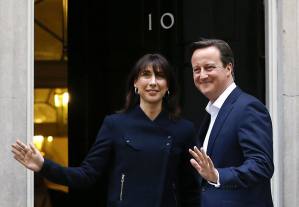
Elections in the United Kingdom took place on Thursday, and despite pre-election reports that it could have been the closest one ever in that country, the Conservatives and Scottish National Party, or SNP, won big at the expense of the Labour Party. In addition to affecting the lives of ordinary British people, the results could impact the special relationship with the United States.
According to Gregory Katz of the Associated Press, Prime Minister David Cameron managed to convince British voters that gains from the SNP, along with a coalition from the Labour Party, would ruin the country, given that the SNP has previously called for Scotland's independence. Labour Party grandee Jack Straw, who will leave Parliament after serving for 36 years, talked about his party's failure in Scotland.
"It is grim," Straw said. "It's an unbelievably bad situation in Scotland which frankly nobody anticipated. Obviously the whole party will have to reassess after the desperate situation in Scotland and the depressing situation in England and Wales."
Straw argued that voters decided to turn to the Conservative fold in the final days of the campaign. He noted that there was a "late surge" for Conservatives in England and Wales.
"The Scottish nationalist landslide gutted Labour's chances, reflecting a tectonic shift in sentiments there," Katz wrote. "Throughout the campaign, Scottish voters told pollsters and journalists they were tired of being taken for granted by Labour, and many had not been impressed when [Ed] Miliband joined forces with Cameron to urge Scottish voters to reject independence in a September referendum. Scots whose families had for decades voted Labour turned away in droves."
Katz reported on the irony that helped benefit both Cameron and the Conservative Party, who are also known as "Tories" in the UK.
"Cameron and his party have long been extremely unpopular in Scotland, but he managed not only to triumph in his bid to keep the United Kingdom together with the 'No' vote on independence in September, he also benefited greatly from the fallout from that vote, which proved so damaging to Labour," Katz wrote.
According to Katz, the junior partner of the current governing coalition, the Liberal Democrats, lost most of their 56 seats in this election cycle.
"The party had carried the banner of hope, change and honesty in the 2010 election, and has paid a heavy price for party leader Nick Clegg's about-face on raising tuition fees and other issues," Katz wrote.
Stephen Collinson of CNN argued that people in the U.S. should care about the results of the UK election because the "special relationship" between both countries could be at risk in the years to come. Joe Twyman, head political and social research at YouGov, a British public opinion research firm, described what changes could happen in the next five years.
"We could see over the next five years Scotland going for a referendum for independence again. We could see a referendum on Britain's membership of the European Union, which might result in Britain leaving Europe," Twyman said. "This could have enormous implications, both for people in this country now, but also for generations to come."
According to CNN, Cameron's mean would mean the UK could be on the path to a referendum on the country's role in the European Union.
"Cameron is promising to renegotiate the terms of Britain's membership in the bloc and to hold a vote by 2017 on whether Britain should stay in," Collinson wrote. "The result of such a referendum is difficult to forecast."
The surprising surge of the SNP in Scotland could affect relations between the U.S. and UK beyond the idea of Scottish independence, according to Collinson.
"The SNP is opposed to a project to update the UK's Trident nuclear missile system," Collinson wrote. "That has caused consternation in Washington over the kind of message standing down the nuclear arsenal would send about NATO's readiness and capability at a time when Russian President Vladimir Putin's revival of Cold War-style bombast has sent shivers through the West."
However, Brendan O'Neill of Reason contended that regardless of who ends up forming the next government coalition, the average British person could still lose in terms of freedom.
"Even amidst all this uncertainty about the result, and the yawn-inducing dullness of the campaign, there's one thing we can be sure of: whoever wins, freedom loses," O'Neill wrote. "None of the main parties takes liberty remotely seriously."
O'Neill contended that the promises made by all the parties would add up to a more "authoritarian Britain" that could rework "the relationship between the state and individual."
"We aren't really expressing our political will and shaping the destiny of the nation," O'Neill wrote of the UK election. "No, we're choosing between different gangs of authoritarians who want to shape us; who want to change the people's will, not reflect it; who want to act as our 'surrogate willpower' and decide how we should live our lives. We're voting for the negation of our own moral autonomy."







